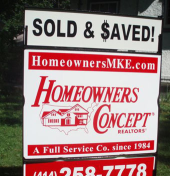The Buying Process
It is best to get pre-approved by a mortgage broker such as one from Union Home Mortgage. Mortgage brokers have many more options available to them than a bank or credit union because they represent many lenders. A pre-approval allows you to move swiftly when you find the right home. It also indicates to the seller that you are serious about home buying and can afford to buy the property.
Which location (s) of Greater Milwaukee would best serve your needs? What features are most important to you? Create a home “wish list.” Write down all the things you want from a home. Include the size, features, location, etc. Categorize each item on the list as a “need” or a “want.” This list will save you time, narrow down your search, and help you stay focused.
Our website offers one of the easiest ways to search especially using the map feature.
The registration is free and easy and gives you the upper hand to look at properties before the general public.
Showings will either be conducted by the seller or via one of our agents unless you have your own agent. Our agents can show you any property on the market. Click for the office nearest the area you are interested in. Our agents sell 3-4 times more homes per year than the average agent and have 19 years in business vs 4.5 years for the industry.
Once you have found a home that meets your needs, it is time to make an offer on the property. You will already know the most you can spend from the pre-approval, and you probably will have your own ideas on what the property is actually worth. In addition, the agent of the specific property can guide you through the negotiation process and offer procedures.
With the offer you make or soon thereafter you will have to submit earnest money (usually about 1% of sales price) as it shows good faith on your part to go forward with the deal. Earnest money is held by the broker in a trust account and you will be given a credit for the amount at closing.
A home inspector will examine the home’s roof, foundation, heating and/or cooling system and other important areas. Should the inspection reveal any defects, the agent you are working with will assist you in drafting the proper notice/amendment to the contract.
Upon application the lender will provide you with a good faith estimate and order the appraisal. When the underwriter approves the loan, you will receive a commitment letter and you will be ready to set up closing.
Before the closing you will have to get homeowner’s insurance. Your lender will let you know exactly how much money you need to bring to closing in the form of a cashier’s check. Closing will take place either at the broker’s office, the lender’s or at the attorney’s office performing the closing for the lender.
FULL SERVICE REAL
ESTATE at 1.5% or 3.9%!

Outstanding Service
Great Zillow Reviews
A+ BBB Rating – Since 1984!
